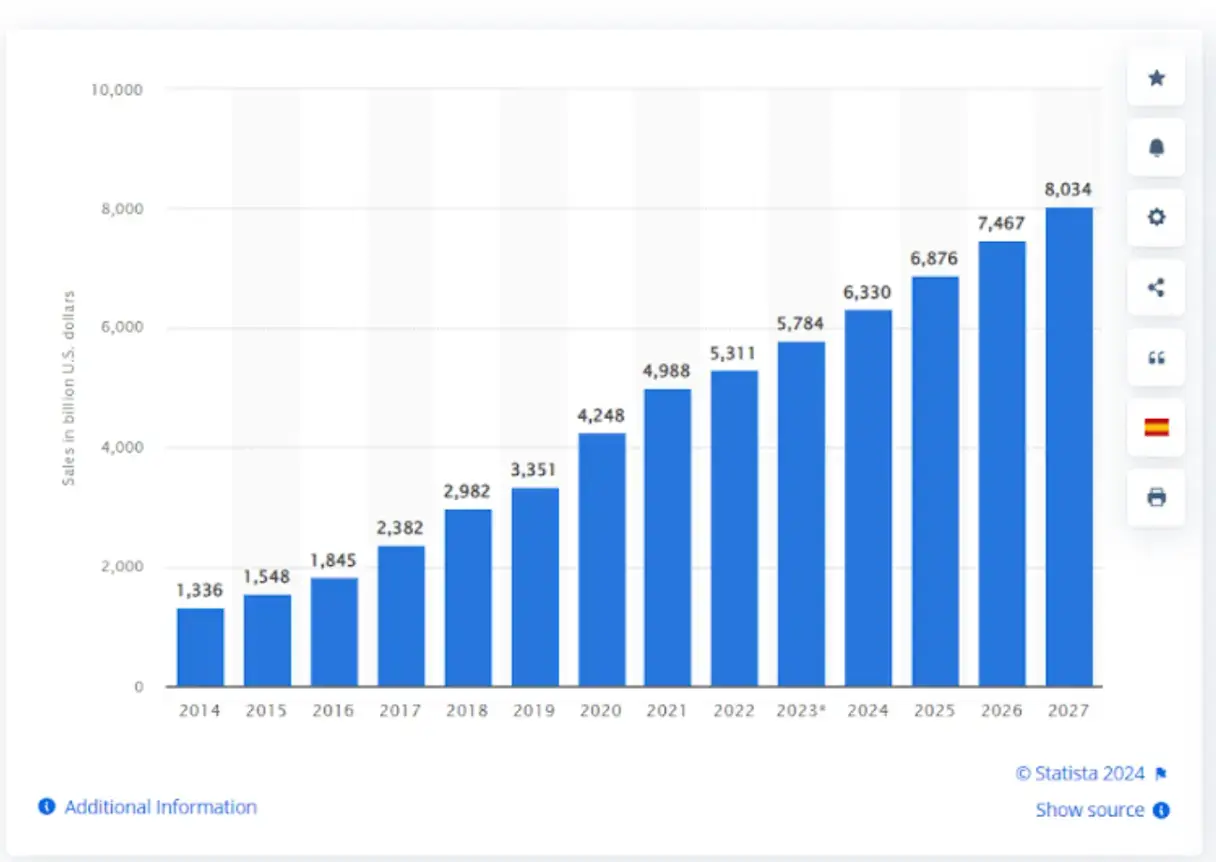ECommerce has become a central aspect of our daily lives, with global retail eCommerce sales reaching 5.8 trillion U.S. dollars last year and expected to surpass 8 trillion dollars by 2027. As mobile usage continues to rise, one solution has been capturing attention: the progressive web app (PWA).
In this article:

Source: Statista
PWAs are brilliant at delivering a seamless user experience across various platforms, making them a remarkable tool for business owners who aim to connect with their audience more meaningfully.
While many eCommerce companies have already started using PWAs, some still need to decide if it's right for them.
In this comprehensive guide, we're giving you the 411 on PWAs in eCommerce, covering everything from the basics to the transformative benefits they can bring to your brilliant business. Let's get started.
What is a PWA in ECommerce?
Progressive Web Apps (PWAs) are a smart blend of standard web pages and sleek native mobile apps you download from the app store.
Built using familiar web technologies like Java, HTML, and CSS, they can be accessed through your web browser without a separate app download and also work offline.
Suppose you run a business that sells AI tools for small business owners.
You could have your own PWA for your store. With this sleek solution, customers can browse through your AI tools, add products to their carts, and place orders without downloading a separate mobile app.
Plus, the PWA's offline capability ensures that even without an internet connection, customers can still explore your offerings and make purchases.
It's all about convenience and sales efficiency, streamlining the shopping experience for your customers.
Benefits of Progressive Web Apps

Source: Unsplash
Now, on to the most important aspect of this blog: the benefits. In this section, we’ll explore how Progressive Web Apps can help your eCommerce business thrive in such a competitive world.
Shorter development times
PWAs offer a faster development process than native apps. Developers can tap into existing web code and tweak it to craft an engaging PWA.
This means shorter development cycles, getting your app to market faster, and staying agile to keep up with the shifting market needs.
How does this work, you ask? Unlike native apps, which often require separate development tracks for different platforms (such as iOS and Android), PWAs follow a "write once, run anywhere" approach. This approach saves time, money, and resources needed to launch your app across various platforms.
If you're considering expanding your eCommerce operations, PWAs offer a cost-effective solution and streamline hiring eCommerce staff.
Enhanced user engagement with the push notifications feature

Source: Unsplash
Boosting user engagement is a big deal in PWA eCommerce, and push notifications play a major role.
This feature is so beneficial because, unlike emails, you don't need your customer’s contact details or an account. They can reach your customers whether they’re on their computers or phones, giving you a broader audience to connect with.
This tailored approach increases the likelihood of user interaction and fosters a sense of urgency and excitement, driving them back to your app or website for more.
But don’t just take our word for it. In a client case study, Trivago reported a 150% increase in engagement since introducing its PWA, which is available in 33 languages and across 55 countries.
This increased engagement also led to more conversions, with 97% more click-outs to hotel offers.
Native app-like experience
PWAs are built to mirror the appearance and functionality of native apps. That means they have smooth animations, layouts that adjust to your screen, and all the familiar features you'd expect.
This is great for your users as it makes everything feel easy and comfortable.
Additionally, PWAs can use your device's camera and location services. With integrations of generative AI, they can even offer more personalized experiences, just like native-AI apps.
For example, if you own an eCommerce fashion store, your customers can browse a stunning collection of clothing and accessories, complete with high-resolution images and interactive features, via a PWA.
They can also use their device's camera to virtually try on different outfits, and the AI integration can suggest styling tips based on their preferences and past purchases.
Moreover, implementing custom progress bars in your PWA can guide users through complex processes, such as order tracking or form completion, enhancing the user experience and encouraging repeat visits.
Faster loading times

Speed is a critical benefit of PWAs that cannot be overstated, especially for page load times. It's more than just a technical advantage.
The secret behind this remarkable speed lies in the smart use of service workers in PWAs.
These service workers operate quietly in the background, caching essential elements of the web app during the initial visit. Subsequent visits benefit from this preloaded content, resulting in significantly faster page load times.
Instant updates
Another standout feature of progressive web apps is their ability to update instantly. This sets them apart from traditional mobile apps, ensuring users always have the latest version without any manual effort.
Unlike regular apps that require users to download updates from an app store, PWAs are updated directly on the web server.
This means any changes or improvements developers make are instantly applied the next time the app is accessed.
For example, if you have a PWA for your eCommerce healthy snack company and decide to introduce a new product line or update the checkout process, these changes can be implemented seamlessly on the server side.
When customers revisit the PWA to check out the latest offerings or make a purchase, they'll automatically experience these updates without needing to download anything.
They work offline
We touched on this earlier, but it's a big benefit: progressive web apps can actually work offline.
Now, think about it from a business standpoint. Say you're running an online delivery service.
If a customer loses their internet connection while placing an order, this isn’t a big issue, unlike with a web page or native app.
With a PWA, they can keep browsing the menu, add items to their cart, and even complete checkout, all without a live connection.
Working offline means your app can reach even more people. Think about users in areas with spotty internet or those with limited data plans. They're not left out in the cold anymore.
Whether they're checking out news articles, shopping online, or using handy tools, PWAs ensure they can stay connected and get stuff done, no matter their internet situation.
SEO-friendly

Source: Unsplash
In addition to being user-friendly, PWAs are also search engine-friendly. That’s because they boast a responsive design that adapts seamlessly to any device and loads fast, which search engines love.
These factors, along with their compatibility with search engine algorithms, make PWAs more likely to rank higher in search results, driving more organic traffic to your store.
Moreover, for businesses concerned about maintaining their SEO rankings and reputation, PWAs offer an additional advantage. By using dedicated IPs for their PWAs, eCommerce websites can improve security, stability, and control over their online presence.
Dedicated IPs provide a unique address exclusively for your PWA, minimizing the risk of being associated with any potentially harmful activities on shared IP addresses.
This not only enhances your site's credibility in the eyes of search engines but also helps maintain consistent search rankings and safeguard your brand reputation.
This increases your online presence and brand awareness and boosts your chances of earning valuable backlinks, which are like gold in the world of SEO.
Let’s say you own an eCommerce beauty company specializing in natural skincare products.
A PWA for your store would not only provide a smooth shopping experience for customers but also improve your online visibility.
Users searching for organic skincare solutions are more likely to discover your store through search engines, thanks to the SEO-friendly nature of your PWA.
Plus, the shareability of your content encourages customers to spread the word, leading to increased brand exposure and potential sales that you can track through your KPI dashboard.
Final Thoughts
So there you have it—our complete guide on Progressive Web Apps, packed with information on what they are and how they can benefit your eCommerce business.
The benefits of PWAs for eCommerce businesses are undeniable.
They provide a seamless user experience, combining the best features of web and native mobile eCommerce apps.
They enhance user engagement through push notifications, offer a native app-like experience at a fraction of the cost, and boast faster loading times.
PWAs also help drive much-needed organic traffic to your store and improve your brand's online visibility. They enable instant updates, keeping your app current without disrupting the user experience.
Perhaps most importantly, PWAs can work offline, reaching users in areas with limited connectivity and expanding your audience's reach.
So, if you’re considering investing in your eCommerce business's future, PWAs are worth exploring. Their versatility, performance, and user-friendly nature make them a valuable asset in today's digital landscape.
Author Bio
Jenna Bunnell is the Senior Manager for Content Marketing at Dialpad, an AI-incorporated cloud-hosted unified communications system that provides valuable call details for business owners and sales representatives through features such as Dialpad cloud phone systems.
She is driven and passionate about communicating a brand’s design sensibility and visualizing how content can be presented in creative and comprehensive ways. Jenna has written for sites such as Brightpearl and Voila Norbert. You can find her on LinkedIn.


